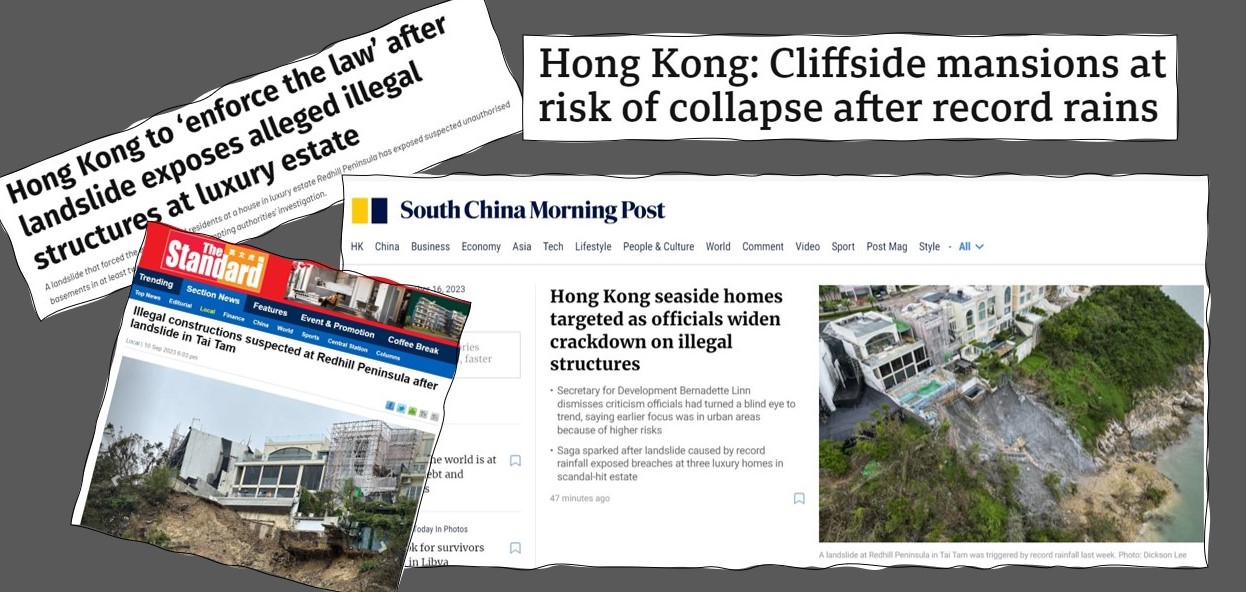By Alex Liu
Hong Kong, 18 September 2023: Owners of luxury properties that are illegally modified or encroach on government land should brace for swift enforcement action from the authorities after the much-publicised landslide at Redhill Peninsula. Chief Executive John Lee has warned his administration will “take action in accordance with the law”, including prosecuting and claiming costs, if homeowners are found to have violated building regulations.
The landslide, which followed record rainfall, exposed illegal structures at three Redhill properties adjacent to the sea. Number 72 – from which residents were evacuated – was found to have an unauthorised basement and to have illegally removed part of a wall to install windows. Next door, house 70 had illegal structures including a basement. Number 74, belatedly inspected by the Buildings Department after the occupant initially refused access, was discovered to have a three-storey illegal structure.
It would be fanciful to believe these are isolated cases. Liber Research Community, an urban planning NGO, reveals it has pinpointed 21 instances of alleged illegal land use at Redhill, an upmarket private development on southern Hong Kong island. The problem extends to other luxury estates, it says. After analysing satellite imagery and government planning documents, the lobby group has identified more than 170 instances of potentially illegal occupation of government land with swimming pools, extended gardens or other facilities.
These, of course, are outdoor extensions which can be highlighted with relative ease. It is reasonable to assume that countless other properties across Hong Kong have internal modifications which have been completed without planning permission.
We have previously examined the issue of unauthorised building works (UBWs). Last April, we highlighted a report by the Ombudsman that called for the authorities to adopt a tougher stance and which outlined multiple ways to speed up enforcement action. That report centred on the widespread problem of illegal modifications to village houses in the New Territories. In June, we noted heavy media coverage of a potentially dangerous flat renovation in Lohas Park that underscored the need for property owners to be fully aware of their legal obligations regarding structural alterations in private buildings. The Redhill episode now turns the spotlight on luxury properties.
Once again, it is worth stressing the heavy penalties which can be imposed for carrying out building works without prior approval: a maximum fine of HK$400,000 and two years’ imprisonment, rising to HK$1 million and three years if the works cause, or are considered likely to cause, risk of injury to persons or damage to property. Failure to comply with a statutory order to carry out remedial work is liable to a fine of up to HK$200,000 with a further penalty of HK$20,000 for each day the offence continues.
The dramatic nature of the Redhill landslide – and another at Clear Water Bay in Sai Kung which also exposed an illegal structure at a luxury home – has focused minds on the potential danger of such practices. What might previously have been dismissed as benign non-compliance or debatable land use has become a headline-grabbing safety issue.
It should also be noted that Secretary for Development Bernadette Linn has confirmed the Buildings Department and Lands Department will jointly launch large-scale inspections at Redhill Peninsula. She warns that slope maintenance work will cost millions of dollars, and authorities will, within reason, recover costs from those responsible. Other luxury developments are on the government’s radar. “The checks won’t be limited to Redhill Peninsula but also other detached houses in the city based on their risks. Such seaside detached houses built on slopes should be targeted because they may affect slope safety,” she says.
To be clear, it is the responsibility of homeowners to comply with building regulations. If in doubt, citizens are strongly advised to seek professional advice. Here at BC&C we have considerable experience in property ownership and building management issues and are ready to help.
Alex Liu is Managing Partner of BC&C. He was Chairman of the Appeal Tribunal Panel (Buildings Ordinance) for nine years until 2018 and a frequent legal advisor on the TVB documentary series A Property a Day. His key areas of practice include commercial and corporate litigation, investigations by governmental bodies, and insolvency and debt restructuring. He can be contacted at alex@boasecohencollins.com.



